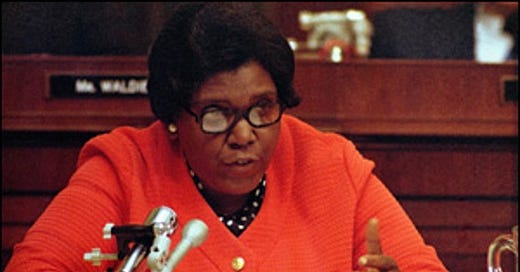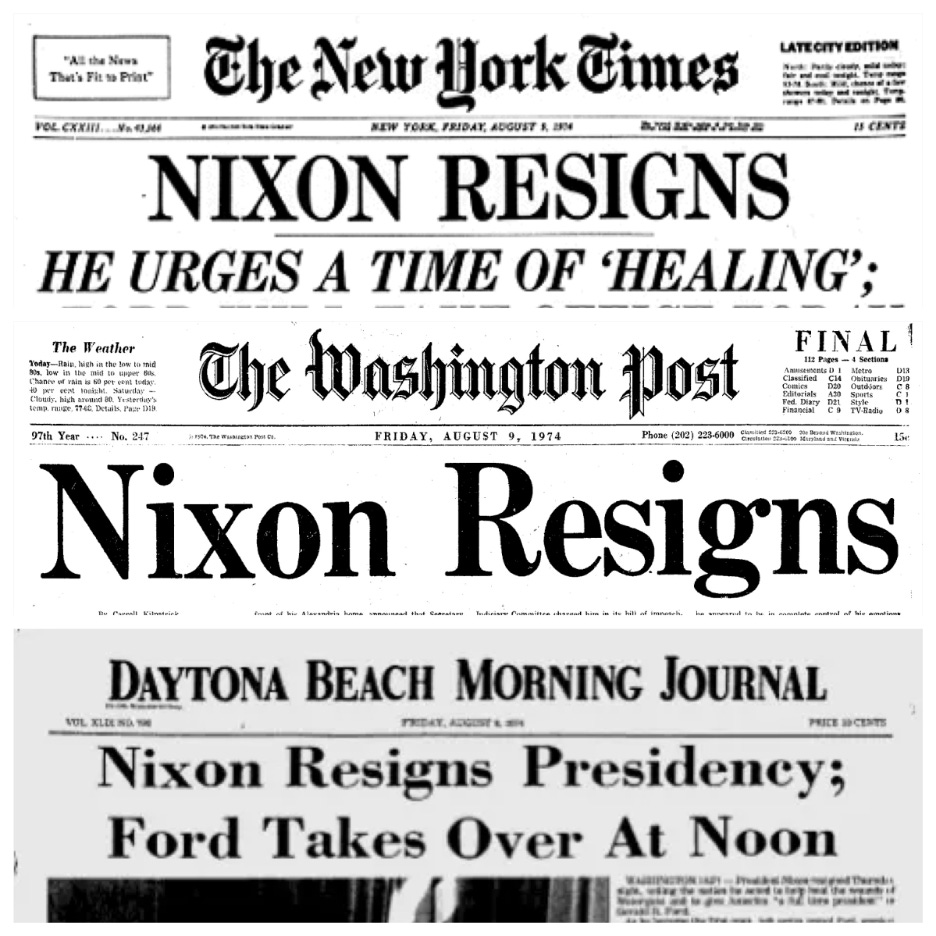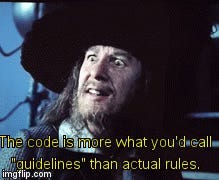Three-Point Shots, Vol. 2, No. 9: August 9, 2024
Fifty years after Nixon's resignation, the constitutional webbing that made the decision palatable to, and even popular with, the American people is coming apart at the seams.
Welcome to another edition of Three-Point Shots, a part of my Life Its Ownself Substack page. If you enjoy reading it, please 1) hit the Like button, 2) subscribe to Life Its Ownself, and 3) share it with others in the link below. Comments are welcome and encouraged.
Friday, August 9, 2024
1. 50 Years Ago Today
On August 9, 1974, Richard Nixon resigned, the first president ever to do so. He’d been engaged in a year-long running battle with the courts and the Congress over his claims of executive privilege regarding the cover-up of both the Watergate burglary and the larger “dirty tricks” operation being run out of the White House.
The last shoe dropped when key congressional leaders met with Nixon to tell him he’d lost the support of his party.
On Aug. 7, 1974, U.S. Sen. Barry Goldwater, R-Ariz., U.S. House Minority Leader John Rhodes, R-Ariz., and U.S. Senate Minority Leader Hugh Scott, R-Pa., made it clear to the embattled Nixon that he faced all-but-certain impeachment, conviction and removal from office in connection with the Watergate scandal. …
In his 1988 autobiography, Goldwater wrote that after hearing their grim assessment, Nixon "knew beyond any doubt that one way or another his presidency was finished."
"None of us doubted the outcome. He would resign," Goldwater wrote.
Nixon resigned because his behavior, much of it unearthed by Washington Postreporters Bob Woodward and Carl Bernstein and immortalized in the book and movie “All the President’s Men,” was something, as they say, up with which the people would not put. The nationally televised hearings of the House and Senate committees investigating the Watergate story had brought its sinister twists and turns before millions of eyeballs, making household words out of “dirty tricks,” “plumbers” and “Alexander Butterfield.”
In the end, Nixon resigned not because he faced some crisis of conscience, but because he had lost the political and social legitimacy of his presidency. Even his most loyal supporters could no longer back him up. Nixon understood that he could not longer hold the office if a critical mass of Americans thought he’d betrayed the standards they expected him to meet in the office.
At that time, of course, there were clearer standards and greater consensus among the American people about meeting them.
2. Saint Barbara Jordan
Barbara Jordan was a second-term congresswoman from the Fifth Ward of Texas and a junior member of the House Judiciary Committee during its investigation of the Watergate scandal. Jordan delivered remarks at the beginning of the committee’s hearings that masterfully set forth the legal and constitutional history of the impeachment power and previewed the case against Nixon. Watch the whole thing.
The most powerful part of her speech, however, was its beginning, where she immortalized her place in the American pantheon:
Earlier today, we heard the beginning of the Preamble to the Constitution of the United States: "We, the people." It's a very eloquent beginning. But when that document was completed on the seventeenth of September in 1787, I was not included in that "We, the people." I felt somehow for many years that George Washington and Alexander Hamilton just left me out by mistake. But through the process of amendment, interpretation, and court decision, I have finally been included in "We, the people."
Today I am an inquisitor. An hyperbole would not be fictional and would not overstate the solemnness that I feel right now. My faith in the Constitution is whole; it is complete; it is total. And I am not going to sit here and be an idle spectator to the diminution, the subversion, the destruction, of the Constitution.
First of all: Who talks like that anymore? Somewhere along the way, politicians and their consultants forgot that they occasionally should inspire their listeners, even at the risk of using big words.
Second, in a nation where partisanship routinely trumps patriotism, who speaks anymore of putting the Constitution above short-term considerations of power and politics, even if not as eloquently as Barbara Jordan?
3. How Strong Is Our Faith in the Constitution?
“My faith in the Constitution is whole; it is complete; it is total.” Fifty years later, Jordan’s words sound idealistic, if not downright Pollyannish.
For 230 years, most Americans treated the Constitution’s provisions as sacrosanct and self-executing: everyone just had to obey the Constitution. C’mon, it’s the law of the land. Nothing more need be said.
In the old days, we used to quibble over what the Constitution and its various provisions meant. From time to time, the Supreme Court would issue opinions that had the effect of refocusing what a particular provision meant. This kept lawyers and law school professors busy inflicting trauma on generations of law school students – who, once they became lawyers, happily joined the ranks of the tormentors.
That’s changed. Now the issue is not whether the latest iteration of constitutional scholarship from the Supreme Court is correct, but rather whether and how much we need to pay attention to any of it.
Your Weekend Reading …
… Texas Monthly asks, “Why Is Ted Cruz Suddenly So Passionate About Women’s Olympic Boxing?” Actually, the answer will not surprise you. (Hint: pandering)
… Robert F. Kennedy, Jr., will be on the ballot in Texas in November.
… News from next door: Would a re-elected Donald Trump launch missile attacks targeting Mexican drug labs? Nah. … Wait, would he? The GOP is warming to the idea.







As a young adult witnessing the slaughter in southeast Asia, the impunity of those in power, and the delays in accountability for Nixon's felonies, I could not look at my nation's flag without sadness and some measure of disgust. That is until I heard Barbara Jordan's inspiration and hope for national redemption.
Nixon's post-resignation statements showed that he did not leave because of shame (an attribute he lacked), but because he no longer had the loyalty needed to continue.
Many years ago when returning to AUS, Barbara's statue, newly enthroned, greeted me in the baggage area of the airport. Seeing her there really pissed me off. Had that sense of "Well, we don't got nowhere else to put her so let's stick here down with the bags." After some considered reflection, I've come to believe that the AUS baggage area is exactly where Barbara would want to be. That's where We The People congregate. It's messy, chaotic, oft exhausting, and illustratively democratic. Ain't no private air where you never touch your bags; hell, at AUS, on occasion you don't even get your bags. No, Barbara is with us, and we with her, inspiring the returning exodus to search for our belonging.